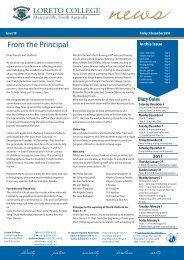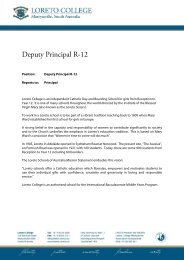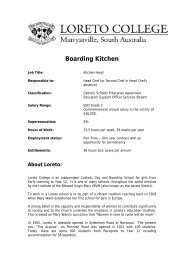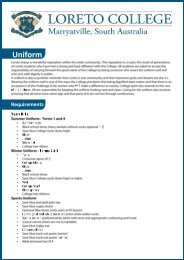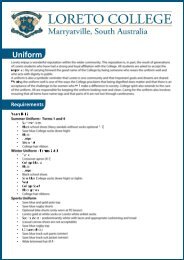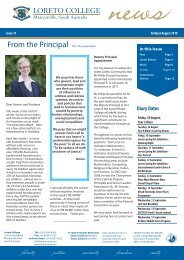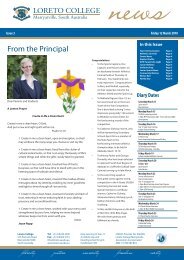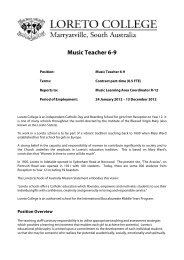<strong>IB</strong> <strong>learner</strong> <strong>profile</strong> <strong>booklet</strong>As a key cross-programme component, the <strong>learner</strong> <strong>profile</strong> will become the central tenet of the <strong>IB</strong>programmes and central to the definition of what it means to be internationally minded. Thus, the <strong>IB</strong>O isplacing the focus for schools where it belongs: on learning. It is not intended to be a <strong>profile</strong> of the perfectstudent; rather, it can be considered as a map of a lifelong journey in pursuit of international-mindedness.It places the <strong>learner</strong> firmly at the heart of <strong>IB</strong> programmes and focuses attention on the processes and theoutcomes of learning.It is the <strong>IB</strong>O’s intention that the <strong>learner</strong> <strong>profile</strong> will help develop coherence within and across the threeprogrammes. It provides a clear and explicit statement of what is expected of students, teachers and schooladministrators in terms of learning, and what is expected of parents in terms of support for that learning.The <strong>IB</strong> <strong>learner</strong> <strong>profile</strong> in schoolsImplementing the <strong>IB</strong> <strong>learner</strong> <strong>profile</strong>A school’s curriculum includes all those student activities—academic and non-academic—for which theschool takes responsibility, since they all have an impact on student learning. The development of the writtencurriculum, the expression of ideas on paper, is necessary, but alone is not sufficient. The curriculum can bedefined as what is to be learned (the written curriculum), how it is to be learned (the taught curriculum) andhow it is to be assessed (the learned curriculum). This gives equal focus to content, teaching methodologiesand assessment practices. The <strong>IB</strong>O prescribes, to varying degrees in each of its three programmes, thewritten, taught and learned curriculum, but relies on schools for its implementation.The successful implementation of these three dimensions of the curriculum in each <strong>IB</strong> programme dependson the culture and ethos of the school. The values and attitudes of the school community that underpinthe culture and ethos of a school are significant in shaping the future of its young people. In a school thathas a commitment to the values inherent in the <strong>IB</strong> <strong>learner</strong> <strong>profile</strong>, these values will be readily apparentin classroom and assessment practices, the daily life, management and leadership of the school. The <strong>IB</strong>Obelieves that the <strong>learner</strong> <strong>profile</strong> will provide a shared vision that will encourage dialogue and collaborationamong teachers and administrators about how to create the best environment for learning.The <strong>IB</strong>O recognizes that the introduction of the <strong>IB</strong> <strong>learner</strong> <strong>profile</strong> may present a challenge for schools.It invites schools to evaluate critically their learning environment and make the changes necessary toenable all its students and teachers to work towards developing the values of the <strong>profile</strong>. Such changesshould lead to a truly collaborative learning environment, the strengthening of professionalism amongthe teaching staff and a commitment by the school to invest in professional development. For mostschools this will not mean starting from the beginning, but may involve a refocusing of attention, creativethought and resources. For some schools the introduction of the <strong>learner</strong> <strong>profile</strong> will necessitate a majorshift in direction.The <strong>IB</strong> <strong>learner</strong> <strong>profile</strong> as a tool for school developmentFor the <strong>IB</strong> <strong>learner</strong> <strong>profile</strong> to become the central tenet of each <strong>IB</strong> programme, schools will need to adopt aholistic view of school as well as student development. The <strong>learner</strong> <strong>profile</strong> provides a tool for whole-schoolreflection and analysis. Individual teachers, faculty groups, school administrators and school governorsshould ask themselves “To what extent do our philosophy, our school structures and systems, our curriculumand units of work enable students, and the adults who implement the programmes, to develop into the<strong>learner</strong> described in the <strong>profile</strong>?”In addition, teachers, <strong>IB</strong> programme coordinators and school administrators are encouraged to askthemselves questions like the ones presented here. © International Baccalaureate Organization 2006
<strong>IB</strong> <strong>learner</strong> <strong>profile</strong> <strong>booklet</strong>Classroom practices• Is it possible to create more experiences and opportunities in the classroom that allow students to begenuine inquirers?• How much attention do we pay to how students interact with other students in group-work activities?Could we give more time to helping them work effectively as part of a team?• Could we create more opportunities to discuss the ethical issues that arise in the subject(s) we teach?• How well do we model empathy, compassion and respect for others in our classrooms and aroundthe school?Assessment and reporting practices• In formative assessment tasks, do we provide students with enough opportunities to take intellectualrisks, and then support them in taking such risks?• To what extent does the range of assessment strategies we use meet the diverse needs of studentsand encourage creative and critical thinking?• Can we provide time for students to reflect on an assessment task and what they have learnt from it?• What aspects of student development do we report on?Daily life, management and leadership• Do all our teachers see themselves as responsible for the nurturing of lifelong <strong>learner</strong>s?• What is the quality of interaction between students and teachers around the school?• Does the structure of the school day and the schedule facilitate the development of the <strong>learner</strong> as awhole person?• Are support structures in place to oversee the personal, social and emotional welfare of students, aswell as their academic development?• Are students empowered to take responsibility for their own learning?• Are we investing appropriately in ongoing professional development for our teachers?The <strong>learner</strong> <strong>profile</strong> provides a common language for teachers and administrators across the <strong>IB</strong> programmesto discuss student progress, the articulation of the curriculum and the issues of transition betweenprogrammes and school divisions. The <strong>profile</strong> does not provide ready answers to these areas, but it focusesattention on what aims and values underlie the programmes and, therefore, provides a basis on whichimportant decisions can be made. The same applies to a school that implements only one <strong>IB</strong> programme:the <strong>profile</strong> provides a focus and reference point for teacher collaboration and the development of trulyconcurrent learning.Monitoring the <strong>IB</strong> <strong>learner</strong> <strong>profile</strong>In PYP schools teachers are required, on behalf of all students, to assess and report on progress in thedevelopment of the attributes of the <strong>learner</strong> <strong>profile</strong>. This is done by using the <strong>learner</strong> <strong>profile</strong> for self andpeer assessment, as the basis for teacher/student/parent conferences and through reporting to parents.MYP and Diploma Programme schools are expected to focus on monitoring student development in lightof the <strong>profile</strong> in as many ways as possible, by engaging students and teachers in reflection, self-assessmentand conferencing. Each <strong>IB</strong> World School, as a whole, is also encouraged to reflect on the success of theimplementation of the <strong>learner</strong> <strong>profile</strong>.The <strong>IB</strong>O has developed programme standards and practices that are common to all its programmes. Theimplementation of the <strong>IB</strong> <strong>learner</strong> <strong>profile</strong> is specified in these practices, and schools will be expected toaddress them as part of the self-study in the programme evaluation process. The <strong>IB</strong>O Programme standardsand practices document can be found on the <strong>IB</strong>O public web site and the online curriculum centre (OCC).© International Baccalaureate Organization 2006 3




